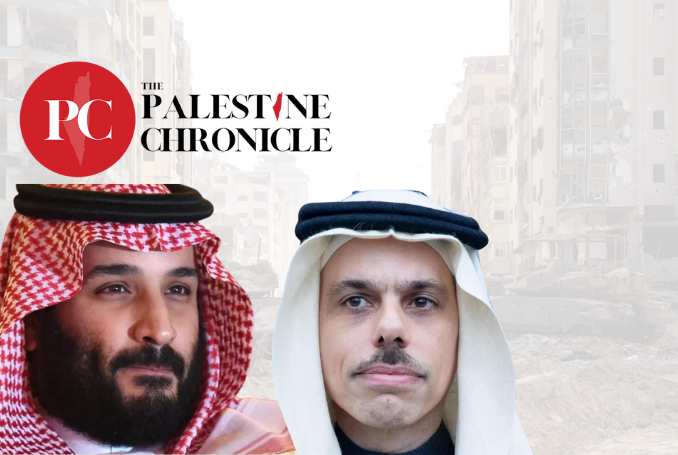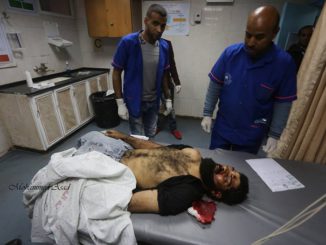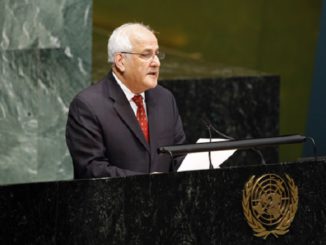
By Palestine Chronicle Editors
Even though Saudi Arabia was not in any way a party in the war between Israel and the Palestinian Resistance, the rich Arab Kingdom was also present in every geopolitical analysis concerning the war.
For months prior to the October 7 attack by Palestinian Resistance and the subsequent Israeli genocide in the Gaza Strip, both Israel and the Saudi government had taken significant steps towards normalization of ties.
The Saudis say that diplomatic relations with Israel were always conditioned on the resolution of the Israeli occupation of Palestine. The Israeli government, however, insisted that no such condition was ever involved in the US-mediated talks.
With an unmistakable sense of triumph, Israeli Prime Minister Benjamin Netanyahu held a poster during his United Nations General Assembly speech on September 20, with a map of the Middle East. Colored in green were the countries that were supposed to be part of Netanyahu’s ‘New Middle East’. They included Saudi Arabia.
“Peace between Israel and Saudi Arabia will truly create a new Middle East,” Netanyahu said, adding that “such a peace will go a long way to ending the Arab-Israeli conflict. It will encourage other Arab states to normalize their relations with Israel.”
Normalization and Genocide
When the Gaza war began, some American officials continued to promote the idea that normalization is still possible. But when the Israeli killing campaign turned into an outright genocide, the issue of normalization appeared trivial, if not altogether outrageous.
This could be deciphered in the changing political discourse emanating from Riyadh.
On October 8, one day after the Al-Aqsa Flood operation, Saudi Arabia’s Foreign Minister Prince Faisal bin Farhan said that his country rejects the targeting of unarmed civilians “in any way”.
On October 14, the intensity of the language became more heightened, though the criticism of Israel was not as strong as Palestinians would have hoped.
“It’s a disturbing situation. It’s a very difficult situation. And, you know, the primary sufferer of this situation are civilians and civilian populations on both sides are being affected,” Farhan said.
Farhan still articulated a political vision, albeit a vague one: “Stop further civilian suffering,” and “de-escalate the situation to quickly bring back peace.”
Turning to Iran, China
Slowly, however, the Saudi position began evolving. On October 30, Riyadh strengthened its political coordination with Iran, through direct conversation between Farhan and Iranian Foreign Minister Hossein Amir-Abdollahian.
On November 3, the Saudis began reaching out to other non-Western political actors, lead among them China, which has repeatedly challenged the US position at the UN Security Council and its obstinacy in rejecting an immediate and unconditional ceasefire.
On November 11, Saudi Arabia played the host, not only of one emergency conference but two: the Arab League and the Organization of Islamic Countries (OIC).
It was Farhan himself who articulated yet the strongest collective position of Arabs and Muslims, declaring that a delegation representing all of these countries will travel the world promoting ceasefire and solidarity with the Palestinian people.
Interestingly, the delegation, which included Farhan, first made its way to Beijing, not Washington, then Moscow, before traveling to London for further talks.
At that juncture, the Saudis were not only critical of the Israeli war, but of Israel’s allies who, according to the Saudi Crown Prince Mohammed Bin Salman himself, have contributed to “the failure of the Security Council and the international community to put an end to the flagrant Israeli violations of international laws.”
At this point, Farhan was being seen as a leader of Arab diplomacy through a completely different set of language compared to that of October 8.
“We are starting to see a shift in positions, not enough yet, but moving in the right direction,” he said at a news conference after the summit. “We are starting to hear that countries that used to give Israel a blank check are now talking about protecting civilians and the importance of conducting combat within the boundaries of International Humanitarian Law and humanitarian pauses.”
Though the Saudis had ruled out the use of their economic clout to put an embargo on Western countries that support and finance the Israeli war on Gaza, the Crown Prince took a few steps closer to what has been considered a strong position.
During his speech at the extraordinary BRICS summit on Tuesday, November 21, Bin Salman condemned “the brutal crimes that Gaza is witnessing against innocent civilians,” demanding that the international community “put a halt to this humanitarian disaster”.
Saudi Arabia’s Crown Prince Mohammed bin Salman calls for an arms embargo on Israel during BRICS summit. #Gaza
— Sameer Hashmi (@sameerhashmi) November 21, 2023
He reiterated the Riyhad summit’s denunciation of “the Israeli aggression on the Gaza Strip”, rejecting any “pretext justifying it” and, perhaps most importantly, “urging all countries to stop exporting weapons and ammunition to Israel.”
Interestingly, the incorporation of Israel into the Middle East, and the Israeli-Saudi normalization, was often touted as part of US efforts to strengthen the security of its allies: namely to offer Israel’s military protection to Arab countries in their geo-strategic rivalry against Iran.
For Mohammed Bin Salman to call for an outright embargo on Israeli arms is indicative of Riyhad’s changing attitude toward Tel Aviv – thus any possibility of normalization.
A few hours after Bin Salman’s speech, a ceasefire agreement between Palestinian Resistance and Israel was announced.
(The Palestine Chronicle)







